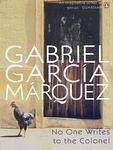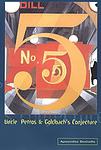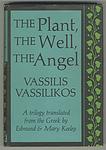The Greatest Greek, Colombian "Fiction" Books Since 1900
Click to learn how this list is calculated.
This list represents a comprehensive and trusted collection of the greatest books. Developed through a specialized algorithm, it brings together 300 'best of' book lists to form a definitive guide to the world's most acclaimed books. For those interested in how these books are chosen, additional details can be found on the rankings page.
Genres
Countries
Date Range
Reading Statistics
Click the button below to see how many of these books you've read!
Download
If you're interested in downloading this list as a CSV file for use in a spreadsheet application, you can easily do so by clicking the button below. Please note that to ensure a manageable file size and faster download, the CSV will include details for only the first 500 books.
Download-
1. One Hundred Years of Solitude by Gabriel García Márquez
This novel is a multi-generational saga that focuses on the Buendía family, who founded the fictional town of Macondo. It explores themes of love, loss, family, and the cyclical nature of history. The story is filled with magical realism, blending the supernatural with the ordinary, as it chronicles the family's experiences, including civil war, marriages, births, and deaths. The book is renowned for its narrative style and its exploration of solitude, fate, and the inevitability of repetition in history.
-
2. Love in the Time of Cholera by Gabriel García Márquez
This novel follows the story of Florentino Ariza and Fermina Daza, who fall passionately in love in their youth. However, Fermina eventually marries a wealthy doctor, leaving Florentino heartbroken. Despite this, Florentino remains devoted to Fermina for over fifty years, patiently waiting for her husband's death to have another chance at her love. The story is set against the backdrop of a cholera epidemic, serving as a metaphor for the transformative power of love and the destructive power of obsession.
-
3. Zorba the Greek by Nikos Kazantzakis
In this novel, a young intellectual who is immersed in books and ideas embarks on a journey with a passionate and adventurous older man named Zorba. The two men have contrasting personalities, which leads to a series of philosophical discussions and adventures. The story is set in Crete and explores themes of life, death, friendship, love, and the struggle between the physical and intellectual aspects of existence. Zorba's zest for life and his fearlessness in the face of death inspire the young man to embrace a more physical and spontaneous way of living.
-
4. Chronicle of a Death Foretold by Gabriel García Márquez
The novel unfolds as a murder mystery, revealing the planned revenge killing of a young man named Santiago Nasar by the Vicario brothers. They believe Santiago has dishonored their sister, Angela, by taking her virginity before her marriage to another man. Despite the impending murder being common knowledge within the small Colombian town, a series of coincidences and misunderstandings prevent anyone from intervening, leading to Santiago's tragic and foretold demise. The narrative explores themes of honor, fate, and the collective responsibility of a community.
-
5. The Last Temptation of Christ by Nikos Kazantzakis
This novel presents an alternative interpretation of the life of Jesus Christ, who is depicted as a conflicted, all-too-human figure who struggles with his divine destiny. The book explores his journey through life, his friendships, his fears, and his ultimate temptation to avoid crucifixion and live a normal life. The narrative delves into the psychological and emotional aspects of his experiences, creating a complex, humanized portrayal of a traditionally divine figure.
-
6. Z by Vassilis Vassilikos
"Z" is a political novel that explores the events surrounding the assassination of a prominent leftist politician in Greece. The story delves into the corruption and violence that pervades the government, with the narrative alternating between the perspectives of the victim, the assassins, the investigators, and the government officials involved. The novel is a critique of political tyranny and an exploration of the struggle for justice in a corrupt system.
-
7. The Autumn of the Patriarch by Gabriel García Márquez
The novel explores the life of an eternal dictator who has ruled over a Caribbean nation for several decades. The patriarch's oppressive regime is marked by corruption, violence, and absurdity, while his personal life is characterized by loneliness and paranoia. The narrative is a complex, non-linear exploration of power, time, and the dehumanizing effects of political tyranny. The patriarch's death prompts a reflection on his life and reign, revealing a mythical, magical, and horrifying reality.
-
8. No One Writes to the Colonel by Gabriel García Márquez
This novel centers around an impoverished, retired colonel who has been waiting for many years for the pension he was promised. Despite his increasing desperation and the urging of his wife, the colonel remains hopeful and proud, refusing to sell his only valuable possession, a rooster that he plans to enter in a cockfight. The story explores themes of poverty, pride, and the struggle for dignity amid difficult circumstances.
-
9. The Vortex by José Eustacio Rivera
"The Vortex" is a gripping narrative set in the early 20th century that plunges readers into the harrowing depths of the Amazon rainforest. The story follows the journey of Arturo Cova, a man fleeing from his troubled past and societal constraints, who becomes ensnared in the brutal world of rubber tapping. As he ventures deeper into the jungle, Cova encounters the relentless exploitation of both the land and its people, driven by the insatiable greed of the rubber barons. The novel exposes the darkness of human nature and the savage conditions of life in the rainforest, painting a vivid picture of the environmental and social devastation wrought by colonialism and the rubber trade.
-
10. The Third Wedding by Kōstas Tachtsēs
"The Third Wedding" is a powerful exploration of love, passion, and societal expectations set in mid-20th century Greece. The story revolves around a strong-willed and independent woman who has been married twice and is about to enter her third marriage. The narrative delves into her past love affairs, her struggle with the societal norms of the time, and her quest for personal freedom. The book is a poignant commentary on the condition of women in a patriarchal society and the sacrifices they make in the name of love and duty.
-
11. The Daughter by Pavlos Matesis
"The Daughter" is a powerful novel set in Greece during the Second World War. The narrative follows the life of a young girl who is forced to grow up quickly due to the harsh realities of war. Her father, a communist, is executed by the Germans, and the girl is left to navigate the complexities of life, politics, and love in a world that is rapidly changing. The book offers a poignant exploration of the human capacity for resilience, survival, and hope in the face of unimaginable adversity.
-
12. Astradeni by Eugenia Fakinou
"Astradeni" is a coming-of-age novel set in post-World War II Greece. The story follows the life of a young girl named Astradeni, who is forced to grow up quickly due to the harsh realities of war and poverty. Despite the hardships she faces, Astradeni maintains a hopeful and imaginative spirit, often escaping into a world of myths and legends. The novel explores themes of resilience, the power of storytelling, and the enduring strength of the human spirit.
-
13. Uncle Petros and Goldbach's Conjecture by Apostolos Doxiadis
The novel follows the story of a young man who becomes fascinated by his reclusive and eccentric Uncle Petros. As he delves into his uncle's past, he uncovers Petros' obsession with proving Goldbach's Conjecture, a famous unsolved problem in number theory. This obsession led to Petros' alienation from society and ultimately his downfall. The book explores themes of mathematical obsession, family relationships, and the fine line between genius and madness.
-
14. The Schoolmistress With The Golden Eyes by Stratis Myrivilis
This novel is set on the Greek island of Lesbos during the Balkan Wars and explores the life of a beautiful and enigmatic schoolmistress who captivates the hearts and minds of the island's inhabitants. Through her interactions with the villagers, soldiers, and especially a young man who becomes deeply infatuated with her, the story delves into themes of love, war, and the complexities of human nature. The narrative is rich with descriptions of Greek island life, blending the personal dramas of its characters with the broader historical context of the era, ultimately painting a vivid portrait of a community at a crossroads of change and tradition.
-
15. Η Σαρκοφαγος by Giorgos Ioannou
This book delves into the complexities of human nature, society, and the existential dilemmas faced by individuals in post-war Greece. Through a series of interconnected stories, the narrative explores themes of loss, despair, and the search for meaning in a world marked by political turmoil and social change. The author masterfully portrays the struggles of ordinary people trying to find their place in a rapidly evolving society, using vivid imagery and deep psychological insight to bring his characters to life. The work is a poignant reflection on the human condition, offering a critical look at the challenges of adapting to a new reality while clinging to the remnants of the past.
-
16. Colonel Liapkin by M. Karagatsis
The novel revolves around the life and experiences of Colonel Liapkin, a Russian émigré living in Athens during the interwar period. Struggling with the loss of his homeland and status, Liapkin navigates the complexities of his new life in Greece, dealing with issues of identity, exile, and the search for meaning in a world that has drastically changed. Through his interactions with a diverse cast of characters, the narrative delves into themes of nostalgia, cultural displacement, and the quest for personal redemption, painting a vivid picture of the émigré experience in the early 20th century.
-
17. The Murderess by Alexandros Papadiamantis
The novel is a gripping tale set in 19th-century Greece, focusing on the life of an elderly woman who becomes a serial killer. Driven by a twisted sense of mercy and the heavy burdens of poverty and societal expectations, she murders young girls to spare them from the hardships of life. The narrative delves deep into themes of morality, gender roles, and the desperation caused by societal and economic pressures. As the protagonist grapples with her actions and their consequences, the story explores the complexities of her psyche and the rural Greek society of the time, offering a profound commentary on the human condition.
-
18. The Story Of Andreas Kordopatis by Thanassis Valtinos
This novel unfolds the life journey of Andreas Kordopatis, tracing his odyssey from his origins in the Peloponnese, through his ventures in the United States and his return to Greece. Set against the backdrop of the late 19th and early 20th centuries, the narrative weaves through the personal and historical, exploring themes of migration, identity, and the pursuit of a better life. Through a blend of personal accounts, letters, and third-person narration, the reader is immersed in the struggles and aspirations of a man navigating the complexities of diaspora and the relentless quest for home and belonging amidst the turbulent tides of history.
-
19. The Plant, The Well, The Angel by Vassilis Vassilikos
This novel weaves a complex narrative that explores the interconnectedness of human life, nature, and the divine. Through the symbolic elements of a plant, a well, and an angel, the story delves into themes of growth, discovery, and spiritual awakening. Set against a backdrop that blends the mundane with the mystical, the narrative follows the journey of its characters as they navigate personal and collective challenges, ultimately seeking redemption and enlightenment. The author masterfully uses these symbols to reflect on the essence of existence, the cycles of life, and the pursuit of meaning in a world filled with both beauty and hardship.
-
20. Η Τιμη Και Το Χρημα by Konstantinos Theotokis
This novel delves into the moral and social decay of Corfiot society through the story of a family torn apart by greed and the pursuit of wealth. The narrative focuses on the protagonist's struggle to uphold his integrity and moral values in the face of societal pressure to prioritize financial gain over personal honor. Set against the backdrop of late 19th-century Corfu, the book offers a critical examination of the impact of materialism on human relationships and the corrosive effect of money on traditional values and ethics. Through its vivid portrayal of the protagonist's internal and external conflicts, the novel presents a timeless exploration of the human condition and the choices individuals must make between material wealth and moral virtue.
-
21. Difficult Nights by Melpo Axioti
This book is a poignant exploration of human emotions and experiences, delving into the depths of despair, love, and the quest for meaning in a tumultuous world. Through a series of interconnected stories, the narrative weaves together the lives of various characters, each struggling with their own inner turmoil and societal constraints. Set against the backdrop of early 20th-century Europe, the book captures the essence of the human condition, portraying the complex interplay between personal desires and the harsh realities of life. With its rich, lyrical prose, the novel invites readers to reflect on the nature of difficulty, the nights of the soul we all must navigate, and the glimmers of hope that sustain us through our darkest hours.
-
22. Η κρύπτη by Ε.Χ. Γονατάς
The book unfolds within the mysterious and eerie confines of a crypt, where secrets from the past and present intertwine. As the protagonist delves deeper into the crypt's enigmatic depths, they encounter a series of cryptic clues and supernatural occurrences that challenge their understanding of reality. The narrative masterfully blends elements of horror, mystery, and historical fiction, leading readers on a suspenseful journey through time and darkness. The crypt, with its ancient allure and hidden dangers, becomes a character in its own right, revealing truths that are as unsettling as they are enlightening, ultimately confronting the protagonist with a revelation that could alter their perception of life and death.
-
23. The Great Chimera by M. Karagatsis
This novel is a captivating tale set in the early 20th century, revolving around the life of Maroussa, a young woman from the Greek island of Hydra. After marrying an older French naval officer, she moves to France, only to find herself trapped in a loveless marriage. Her longing for passion and fulfillment leads her into the arms of another man, setting off a tumultuous series of events. The narrative explores themes of love, betrayal, and the search for identity against the backdrop of cultural and societal expectations. Rich in historical and geographical detail, the story delves into the complexities of human emotions and the eternal quest for happiness and meaning.
-
24. Ο Εξώστης by Nikos Kakhtitsis
This novel delves into the life of a young man grappling with his sexual identity amidst the conservative and oppressive societal norms of mid-20th century Greece. Through a series of introspective monologues and vivid encounters, the protagonist navigates the complexities of desire, shame, and the longing for acceptance. Set against the backdrop of post-war Greece, the narrative explores themes of alienation, the struggle for self-realization, and the quest for freedom in a rigidly structured society. The protagonist's journey is a poignant reflection on the human condition, offering a deep exploration of the internal and external conflicts arising from societal expectations and personal identity.
-
25. Το Μυθιστόρημα της Κυρίας Έρσης by Nikos-Gabriel Pentzikis
This novel is a rich tapestry that weaves together elements of Greek folklore, Byzantine mysticism, and modernist narrative techniques to explore the life and spiritual journey of its protagonist, Lady Ersi. Set against the backdrop of early 20th-century Thessaloniki, a city at the crossroads of cultures and religions, the story delves into themes of memory, identity, and the search for meaning amidst the chaos of existence. Through a blend of poetic language, philosophical reflections, and vivid imagery, the novel invites readers into a world where the boundaries between reality and myth blur, offering a unique and introspective look at the human condition.
Reading Statistics
Click the button below to see how many of these books you've read!
Download
If you're interested in downloading this list as a CSV file for use in a spreadsheet application, you can easily do so by clicking the button below. Please note that to ensure a manageable file size and faster download, the CSV will include details for only the first 500 books.
Download












